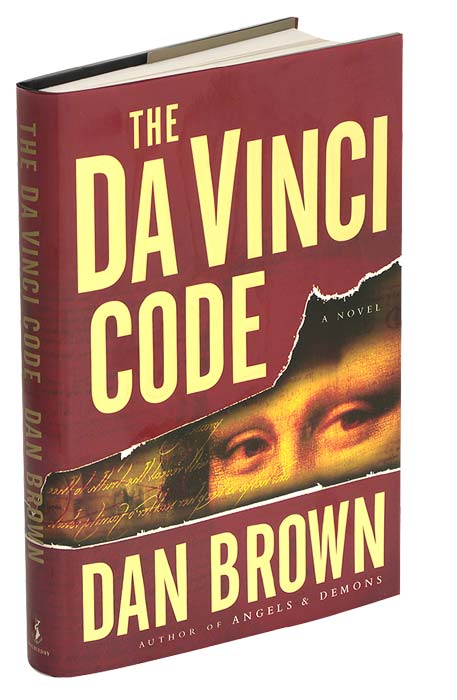Sunday, May 21, 2006
La verdad sobre "El Código Da Vinci"

No sé como será en España, pero durante las dos últimas semanas, uno de cada cuatro anuncios en la TV en EEUU es sobre la nueva película basada en el libro de "El Código Da Vinci".
En todos los periódicos se debate sobre si los hechos que describe el libro son reales: que si el Opus Dei es tan malo como lo pintan, que si María Magdalena tal o cual, etc.
Al principio, el Opus Dei consideró demandar a Dan Brown (autor del libro) o a Sony Pictures (productores de la peli), pero parece que al final está sacando ventaja de la publicidad: el número de personas interesadas en unirse al Opus Dei aumenta, parece que atraídas por el rollo "mortificación corporal":
As it happens, the “Da Vinci Code” experience has provided Opus Dei itself with a valuable marketing tutorial. After initially considering a lawsuit against Brown or Sony, the prelature decided instead to take advantage of the publicity. The red brick building at Thirty-fourth and Lexington has been opened to reporters, and so many tourists stop by that the prelature began leaving recruitment literature by the front entrance.
[...]
The Web site has received more than three million visitors, and Peter Bancroft, Opus Dei’s national communications director, says that some of the curious have now become members. The Silas wannabes are generally screened out.
[...]
“It’s odd, really,” Bancroft says. “Every once in a while, we get an e-mail from somebody who’s really fascinated by the cilice and the discipline, and says he would like to join up if he can use them. And that’s not the kind of person that we’re looking for.”
Esta página web, escrita por (creo) un periodista católico que suele cubrir noticias de tipo religioso, aclara algunas de las dudas sobre el libro:
[...]
Q: What does all this have to do with Jesus? Or, for that matter, Leonardo Da Vinci?
A: The premise of the book is that Jesus was married to Mary Magdalene, and that the two had children, who passed along Jesus' bloodline through generations of French people. Leonardo was the member of a secret brotherhood of painters who protected this secret by painting pictures of men that look like ladies.
[...]
Q: Okay, explain this whole "painting pictures of men who look like ladies" thing. What does it have to do with Leonardo?
A: In 1099, a reggae group called the Priority of Zion was founded to hush up the truth about Jesus' French children. It was felt at the time that if word got out that Jesus had lived in France, it would drive up real estate costs beyond what the knights were willing to pay. So the Priority of Lion was formed to keep the secret. Throughout the centuries, every time someone became prominent in Europe - Botticelli, Sir Isaac Newton, Tintin - they would be enrolled into the Prior of Zionism to help keep the secret.
Q: Doesn't it seem more sensible, if they wanted to keep a secret, not to enroll high profile Europeans?
A: Yes, except that it was hard for many years to avoid famous Europeans. From 1755 to 1914, everyone in Europe was either an author, inventor, or executed king.
[...]
Q: Why are Christians so upset about this book, if it's true?
A: Christians are dedicated to covering up The Truth about Jesus and the society of lady/man painters. What Brown uncovered in his research is the shocking truth of Christianity: Jesus was a regular dude, and a regular dude who wanted Mary Magdalene to be the first pope. Christians don't want that to come out, because the central tenet of Christianity is oppressing women. That, and getting Republicans into office.
[...]
Q: That's another question. Why, in the book, is the Catholic Church the only Christian body in the world? Doesn't Brown realize there are countless different Christian denominations, often with widely varying views on Jesus? Where, for the love of Pete, are the Orthodox?
A: Look, can you imagine a Lutheran synod or a group of Orthodox bishops commissioning a mad albino monk to hunt down an inquisitive Harvard professor? Do the Lutherans even have monks, let alone mad, albino ones? So there you go.
Q: Well, that kind of brings me to my next point. Why is the main character described as a professor of religious symbology at Harvard? Is there such a thing as "symbology"?
A: Not in a narrow, Western sense, no. But in the sense that there is a Santa Claus who brings toys to all the Christian children of the world, yes.
Q: The book also claims that the Council of Nicea decided for the first time that Jesus was divine. Is that an accurate representation of the council?
A: Yes, except Brown left out a few things. The Council of Nicea also voted to decide that Homer wrote "The Iliad" and "The Odyssey" but not "Strawberry Fields Forever"; that vanilla is the best ice cream flavor; that rap music started to decline in creativity around 1993; and that George Sisler is the best pure hitter in the history of baseball.
[...]
Q: Why does the dialogue in the book which is supposed to be in French include French words alongside the English translation, like, "Pain is good, monsieur" and "Le capitaine is happy you decided to stay overnight"?
A: That is how the French speak. There is no French language per se, just a few words they throw into English sentences to make themselves seem superior to Americans.
Comments:
<< Home
Hola:
Ya era hora de que pusieras algo nuevo. Tanto trabajar no debe ser bueno.
Los que visitamos la web tenemos derechos... ;-)
Saludines Ruty
Ya era hora de que pusieras algo nuevo. Tanto trabajar no debe ser bueno.
Los que visitamos la web tenemos derechos... ;-)
Saludines Ruty
Claro, como aquí estoy yo solo y no tengo con quién jugar al mus o al Magic, pues claro... no hago más que trabajar!
ch.
ch.
Dicen que por muy estupida que sea una idea siempre encontraremos a alguien dispuesto a seguirla y dar su vida por ella.
J-1
Post a Comment
J-1
<< Home



